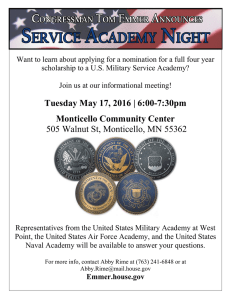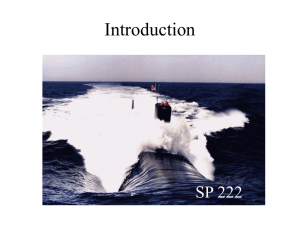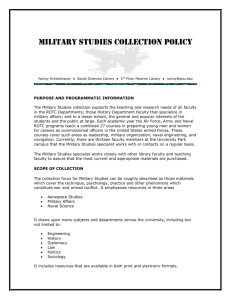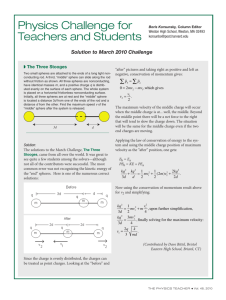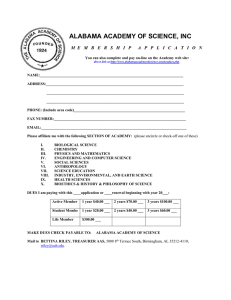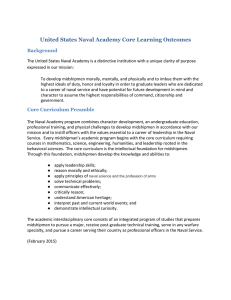JUN Z 6 2014
advertisement
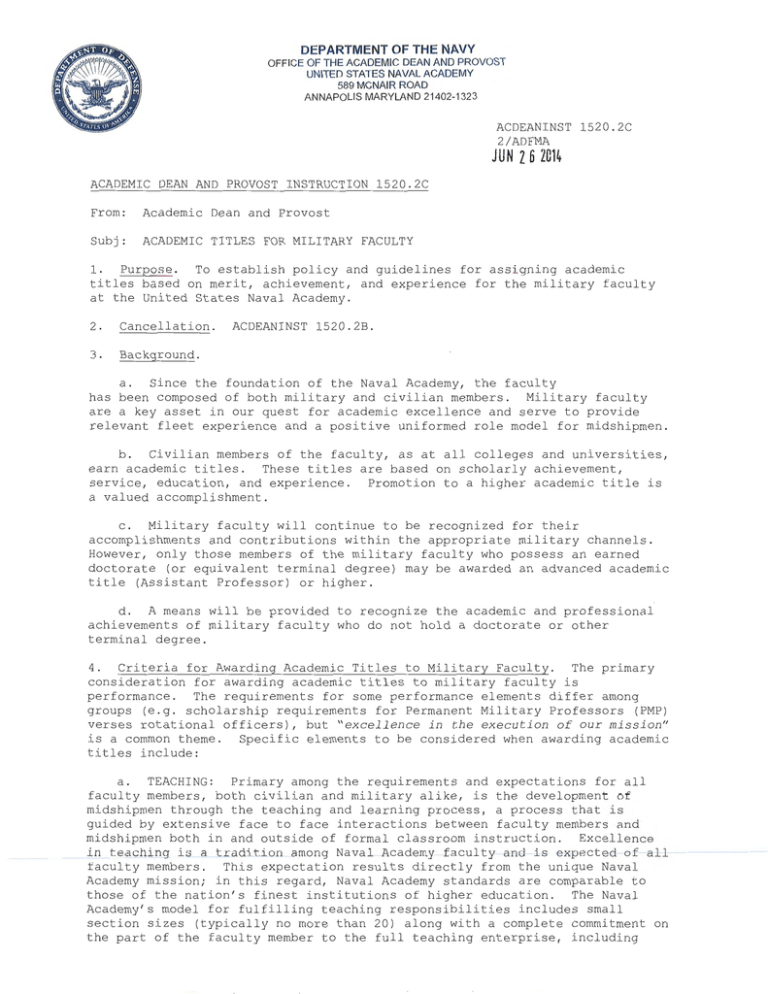
DEPARTMENT OF THE NAVY OFFICE OF THE ACADEMIC DEAN AND PROVOST UN ITED STATES NAVAL ACADEMY 589 MCNAIR ROAD ANNAPOLI S MARYLAND 21402-1323 ACDEANINST 1520.2C 2/ADFMA JUN Z6 2014 ACADEMIC DEAN AND PROVOST INSTRUCTION 1520 . 2C From : Academic Dean and Provost Subj : ACADEMIC TITLES FOR MILITARY FACULTY 1 . Purpose . To establish policy and guidelines for assigning academic titles based on merit, achievement, and experience for the military faculty at the United States Naval Academy . 2. Cancellation . 3. Background. ACDEANINST 1520.2B . a . Since the foundation of the Naval Academy , the faculty has been composed of both military and civilian members . Military faculty are a key asset in our quest for academic excellence and serve to provide relevant fleet experience and a positive uniformed role model for midshipmen . b. Civilian members of the faculty , as at all colleges and universities , earn academic titles . These titles are based on scholarly achievement , service , education , and experience . Promotion to a higher academic title is a valued accomplishment . c . Military faculty will continue to be recognized for their accomplishments and contributions within the appropriate military channels . However , only those members of the military faculty who possess an earned doctorate (or equivalent terminal degree) may be awarded an advanced academic title (Assistant Professor) or higher. d . A means will be provided to recognize the academic and professional achievements of military faculty who do not hold a doctorate or other terminal degree . 4. Criteria for Awarding Academic Titles to Military Faculty . The primary consideration for awarding academic titles to military faculty is performance . The requirements for some performance elements differ among groups (e.g. scholarship requirements for Permanent Mil itary Professors (PMP) verses rotational officers) , but "excellence in the execution of our mission" is a common theme . Specific elements to be considered when awarding academic titles include: a . TEACHING : Primary among the requirements and expectations for all faculty members , both civilian and military alike , is the development of midshipmen through the teaching and learning process , a process that is guided by extensive face to face interactions between faculty members and midshipmen both in and outside of formal classroom instruction . Excellence in teaching is a tradition among Naval Academy faculty and is expected of all faculty members . This expectation results directly from the unique Naval Academy mission ; in this regard , Naval Academy standards are comparable to those of the nation ' s finest institutions of higher education . The Naval Academy ' s model for fulfilling teaching responsibilities includes small section sizes (typically no more than 20) along with a complete commitment on the part of the faculty member to the full teaching enterprise , including ACDEANINST 1520.2C JUN Z6 2014 course development (if tasked) , preparation, classroom instruction , grading , outside of class assistance/consultation with students , and contributions to the ongoing assessment of effectiveness of the academic program in reaching institutional and student-learning goals. Within this model , teaching assignments for research active faculty members (i . e . civilian and PMP faculty) generally average between 9-12 classroom contact hours per week . Exceptions to this may occur , at the discretion of and under the direction of the chain of command, due to certain specific administrative or service assignments (in which case the expected teaching workload may be less) or if a faculty member has discontinued a c ti v e par t icipation in research/scholarship (in which case the expected teaching workload is greater) . An authorized list of such administrative and service duties which may impact teaching assignments is published and updated regularly . Teaching assignments for non - research active faculty members (including all rotational , Junior Permanent Military Professors (JPMP) , and recalled reserve officers) is normally 12 - 15 classroom contact hours per week . Because demonstrated excellence in teaching is the most important of our professional responsibilities , no amount of research , scholarly , or extracurricular accomplishment can outweigh mediocre performance in the classroom . Outstanding teaching requires self-discipline , commitment , and effort . It requires a faculty member to create a challenging but supportive and engaging learning environment . Some examples (not an exhaustive list) of broad measures of effective teaching include the establishment of an environment ( that fosters student learning ; demonstrated student learning and motivation to learn ; modeling professionalism in behavior and interpersonal demeanor in the classroom ; contributions of individual faculty members to the assessment of student learning , and the use of the results to improve student learning and the student experience ; tangible course and laboratory development ; regular peer and student evaluation of the course and instruction received ; mentoring midshipmen in directed study and research courses ; serving as a Trident Scholar or honors advisor (which also represents research and scholarly activity in most cases) ; and serving as a plebe advisor or as an academic advisor/mentor to midshipmen in a major or minor. This last element of "teaching" is often over l ooked , and yet providing high quality , thoughtful , and individualized mentoring and academic advising is an ongoing expectation of all faculty members . Excellence in research and/or scholarship b . RESEARCH AND SCHOLARSHIP: appropriate to the discipline , like excellence in classroom teaching , is also a continuing expectation for all career faculty members (i . e . civilian and . PMP faculty) throughout a career at the Naval Academy . As an inherent part of these career faculty member ' s responsibilities , research and scholarship enhances currency in the discipline , provides opportunities to expand knowledge in the discipline , and frequently involving students in various ways. Compared to teaching and service , research and scholarship can be a more independent faculty - specific aspect of faculty work , and the chain of command generally attempts to provide ample oppo~tunity for such activity through careful scheduling of teaching and service assignments. Tangible evidence of research and scholarly excellence , especially evidence involving a rigorous and substantive peer - validated review process , provides the strongest single indicator of a person ' s currency in his or her academic discipline , as well as exemplifying that person ' s ability to foster a thirst for life - long learning among the midshipmen . Some examples (again , not an exhaustive list) are peer - evaluated publications and presentations ; 2 ACDEANINST 1520 . 2C JUN Z6 2014 authorship of books or book chapters; invitations to participate in or lead conference panels and workshops ; and the acquisition of external research grant support. c . SERVICE : Excellence in service is the third of the three major areas of expected faculty responsibility at the Naval Academy . Without the outstanding service that faculty members provide to the institution , and to its wide range of curricular and extracurricular activities , accomplishing the Naval Academy mission would be impossible . Some examples of service contributions include participating in significant curriculum development activities ; facilitating and leading extracurricular language and cultural immersion activities ; serving on the Faculty Senate ; contributing to department , division, or institutional assessmeni activities ; participating as a faculty representative for a major extracurricular activity or club or varsity sport ; and substantive committee service at every level of the Naval Academy . It may also include professional service such as conference planning , work on behalf of professional organizations , or reviewing books and journal articles . Again , this is not a comprehensive list . Additionally , effective faculty service include an individual ' s demonstrated ability to work effectively with others in advancing the Academy mission beyond the contributions normally associated with classroom teaching and scholarly work . That is , collegiality , · civility , and constructive and productive departmental and institutional citizenship are essential elements of faculty service . 5. Guidelines and Definitions . Military members of the faculty will be awarded one of six academic titles . Officers are already addressed by their military rank, but academic titles , along with rank , will be listed in the catalog and other academic publications. Academic titles should also be noted in the primary/collateral duties section of FITNESS reports . The academic titles and general guidelines for their assignment are listed below : a . INSTRUCTOR : An officer with neither graduate study nor extensive teaching experience . Awarded upon reporting to the Naval Academy . b . SENIOR INSTRUCTOR: An officer with a relevant Master ' s degree , demonstrated performance , and at least one semester ' s teaching experience at the Naval Academy . Consideration for awarding this academic rank will be based on the recommendation of the respective department . c . MASTER INSTRUCTOR: An officer with a relevant Master ' s degree and four or more semesters of superior classroom performance at the Naval Academy . Consideration for awarding this academic rank will be based on the recommendation of the respective department . d . ASSISTANT PROFESSOR : An officer who has completed a doctorate (or equivalent terminal degree) in a given discipline but has little experience beyond the degree in teaching and/or relevant research. Consideration for awarding this academic rank will be based on the recommendation of the respective department . e . ASSOCIATE PROFESSOR : Consideration for awarding this academic rank requires a full review by the Yard - wide Promotion and Tenure committee . 3 ACDEANINST 1520.2C JUN Z6 2014 f . PROFESSOR : Consideration for awarding this academic rank requires a full review by the Yard- wide Promotion and Tenure committee . 6. Policy . a . Academic titles for military faculty will be conferred by the Academic Dean and Provo~t. b . Departments may nominate military faculty for an initial academic title above Instructor a ft e r the first semester of teaching . Departments may nominate individuals for a more advanced title when the guidelines in paragraph (5) are satisfied. c . Recommendations for academic titles of Assistant Professor and below may be forwarded to the Associate Dean for Finance and Military Affairs (ADFMA) via the respective Division Director twice - per - year in the Spring and Fall semesters . The ADFMA will publish separate guidance for submitting recommendations prior to collecting inputs . d . Recommendations for academic titles of Associate Professor and Professor will follow the Yard-wide Promotion and Tenure process . ~ A. T . PHILLIPS Distribution: All Non - Mids (electronically) 4
